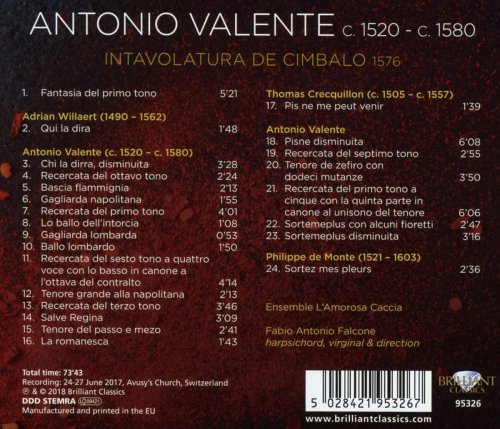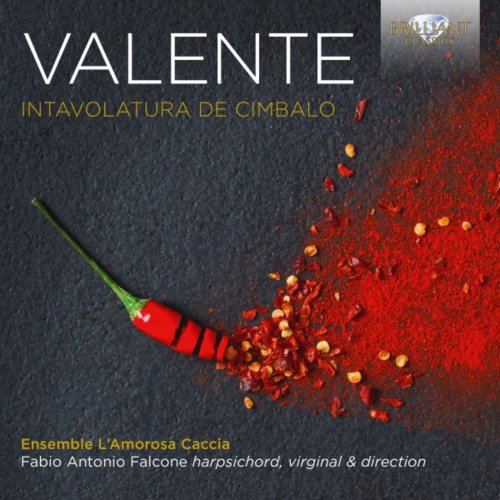
Ensemble L'Amorosa Caccia & Fabio Antonio Falcone - Valente: Intavolatura de cimbalo (2018)
BAND/ARTIST: Ensemble L'Amorosa Caccia & Fabio Antonio Falcone
- Title: Valente: Intavolatura de cimbalo
- Year Of Release: 2018
- Label: Brilliant Classics
- Genre: Classical
- Quality: FLAC (tracks+booklet)
- Total Time: 01:13:27
- Total Size: 461 MB
- WebSite: Album Preview
Tracklist:
1. Fantasia del primo tono 05:27
2. Qui la dira 01:48
3. Chi la dirra, disminuita 03:32
4. Recercata del ottavo tono 02:31
5. Bascia flammignia 02:16
6. Gagliarda napolitana 02:00
7. Recercata del primo tono 04:06
8. Lo ballo dell'intorcia 01:11
9. Gagliarda lombarda 00:53
10. Ballo Lombardo 01:53
11. Recercata del sesto tono a quattro voce con lo Basso in canone a l'ottava del contralto 04:20
12. Tenore grande alla napolitana 02:19
13. Recercata del terzo tono 03:50
14. Salve Regina 03:16
15. Tenore del passo e mezzo 02:41
16. La romanesca 01:47
17. Pis ne me peut venir 01:43
18. Pisne disminuita 06:11
19. Recercata del septimo tono 02:59
20. Tenore de zefiro con dodeci mutanze 03:56
21. Recercata del primo tono a cinque con la quinta parte in canone al unisono del tenore 06:09
22. Sortemeplus con alcuni fioretti 02:47
23. Sortemeplus disminuita 03:16
24. Sortez mes pleurs 02:36

1. Fantasia del primo tono 05:27
2. Qui la dira 01:48
3. Chi la dirra, disminuita 03:32
4. Recercata del ottavo tono 02:31
5. Bascia flammignia 02:16
6. Gagliarda napolitana 02:00
7. Recercata del primo tono 04:06
8. Lo ballo dell'intorcia 01:11
9. Gagliarda lombarda 00:53
10. Ballo Lombardo 01:53
11. Recercata del sesto tono a quattro voce con lo Basso in canone a l'ottava del contralto 04:20
12. Tenore grande alla napolitana 02:19
13. Recercata del terzo tono 03:50
14. Salve Regina 03:16
15. Tenore del passo e mezzo 02:41
16. La romanesca 01:47
17. Pis ne me peut venir 01:43
18. Pisne disminuita 06:11
19. Recercata del septimo tono 02:59
20. Tenore de zefiro con dodeci mutanze 03:56
21. Recercata del primo tono a cinque con la quinta parte in canone al unisono del tenore 06:09
22. Sortemeplus con alcuni fioretti 02:47
23. Sortemeplus disminuita 03:16
24. Sortez mes pleurs 02:36
The Naples of Antonio Valente (c1520-1600) was the principal city of the Spanish Empire of the day, second only to Istanbul of Mediterranean cities in population, a cultural and intellectual hub where ideas were traded as readily as goods at the port. This is the context for ready wit and vivid characters dancing before us in the harpsichord manuscript left to us as the principal work of an instrumental virtuoso who was blind from birth.
Little else is known of Valente, though he became an organist in one of the city’s private chapel between 1565 and 1580, and we know that this Intavolatura was published in 1576, by which time the composer’s reputation had spread
far beyond the kingdom of Naples. It seems certain that the collection was the first of its kind to be written in southern Italy. These are popular dances rather than original melodies, and Valente transcribes and elaborates them in various genres of song and dance: there are hymns (a Salve Regina), galliards, ricercars, ballads, even a flamboyant ‘Bascia Flammignia’, placed in exuberant juxtaposition, hardly designed to be heard in strict order but a collection to delight and entertain.
The Intavolatura does so here, thanks to the imaginative re-instrumentation and sparkling performances of an Italian early-music ensemble, L’Amorosa Caccia. The songs are reattributed to a pair of singers (Giulia Valentini and Marcos Garcia Gutierrez), accompanied by two violas da gamba and a recorder, with the overall artistic direction undertaken from the keyboard by Fabio Antonio Falcone.
Antonio Valente lived and worked in 16th century Napoli, then under Spanish rule and the cultural hotspot of Europe. Valente’s Intavolatura de Cimbalo is the first Neapolitan publication for keyboard instrument and the first that shows the word harpsichord in the title. This is very important because it shows that Valente (who just one year before published «Versi Spirituali per sonar negli organi») clearly wanted to differentiate the composition style between harpsichord and organ (until that time, but also later, this difference is not clear yet). Intavolatura can be considered as an opera omnia collecta as far as it contains all the musical forms of that time: instrumental music (6 ricercari and 1 fantasia), elaboration on a cantus firmus (a Salve Regina), 4 chansons with diminutions, dances on tenori italiani (Zefiro, Passo e mezzo, Romanesca, Gagliarda Napolitana, Intorcia etc) and balli (Ballo Lombardo etc.).
Sung and played by the Ensemble L’Amorosa Caccia, two singers, violas da gamba and recorders, directed from the harpsichord and virginal by Fabio Antonio Falcone, a specialist in this repertoire (he recorded already works by Cavazzoni, Antico and De Macque for Brilliant).
Little else is known of Valente, though he became an organist in one of the city’s private chapel between 1565 and 1580, and we know that this Intavolatura was published in 1576, by which time the composer’s reputation had spread
far beyond the kingdom of Naples. It seems certain that the collection was the first of its kind to be written in southern Italy. These are popular dances rather than original melodies, and Valente transcribes and elaborates them in various genres of song and dance: there are hymns (a Salve Regina), galliards, ricercars, ballads, even a flamboyant ‘Bascia Flammignia’, placed in exuberant juxtaposition, hardly designed to be heard in strict order but a collection to delight and entertain.
The Intavolatura does so here, thanks to the imaginative re-instrumentation and sparkling performances of an Italian early-music ensemble, L’Amorosa Caccia. The songs are reattributed to a pair of singers (Giulia Valentini and Marcos Garcia Gutierrez), accompanied by two violas da gamba and a recorder, with the overall artistic direction undertaken from the keyboard by Fabio Antonio Falcone.
Antonio Valente lived and worked in 16th century Napoli, then under Spanish rule and the cultural hotspot of Europe. Valente’s Intavolatura de Cimbalo is the first Neapolitan publication for keyboard instrument and the first that shows the word harpsichord in the title. This is very important because it shows that Valente (who just one year before published «Versi Spirituali per sonar negli organi») clearly wanted to differentiate the composition style between harpsichord and organ (until that time, but also later, this difference is not clear yet). Intavolatura can be considered as an opera omnia collecta as far as it contains all the musical forms of that time: instrumental music (6 ricercari and 1 fantasia), elaboration on a cantus firmus (a Salve Regina), 4 chansons with diminutions, dances on tenori italiani (Zefiro, Passo e mezzo, Romanesca, Gagliarda Napolitana, Intorcia etc) and balli (Ballo Lombardo etc.).
Sung and played by the Ensemble L’Amorosa Caccia, two singers, violas da gamba and recorders, directed from the harpsichord and virginal by Fabio Antonio Falcone, a specialist in this repertoire (he recorded already works by Cavazzoni, Antico and De Macque for Brilliant).

Download Link Isra.Cloud>>>
Valente_Intavolatura_de_cimbalo.rar - 462.0 MB
Valente_Intavolatura_de_cimbalo.rar - 462.0 MB
Year 2018 | Classical | FLAC / APE
As a ISRA.CLOUD's PREMIUM member you will have the following benefits:
- Unlimited high speed downloads
- Download directly without waiting time
- Unlimited parallel downloads
- Support for download accelerators
- No advertising
- Resume broken downloads


